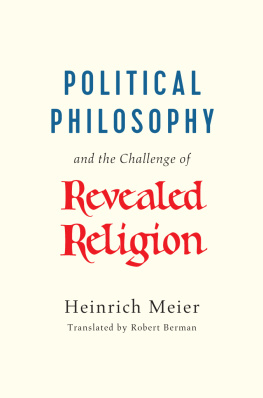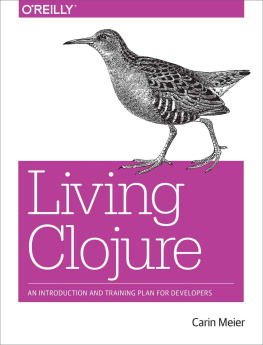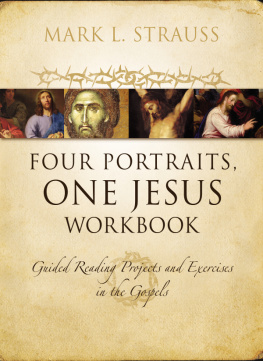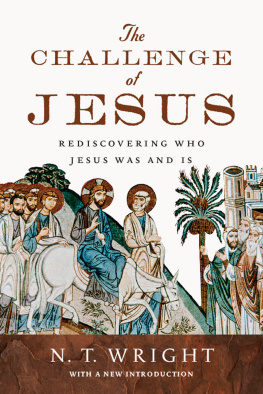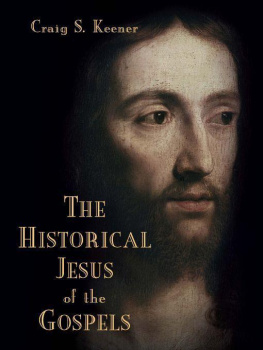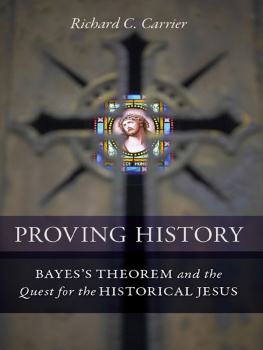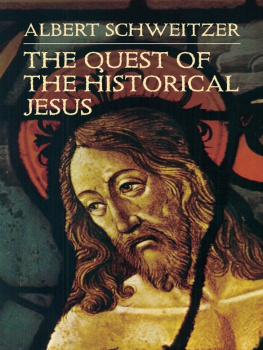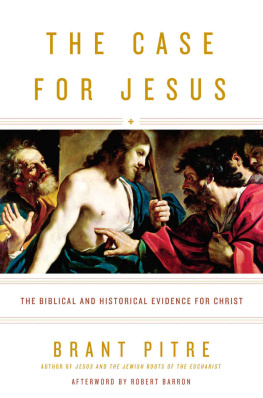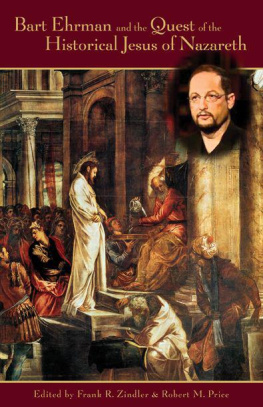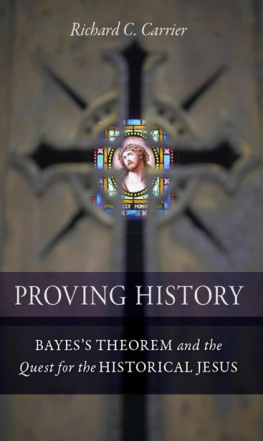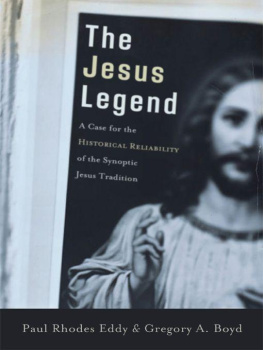A MARGINAL JEW
VOLUME FIVE
THE ANCHOR YALE BIBLE REFERENCE LIBRARY is a project of international and interfaith scope in which Protestant, Catholic, and Jewish scholars from many countries contribute individual volumes. The project is not sponsored by any ecclesiastical organization and is not intended to reflect any particular theological doctrine.
The series is committed to producing volumes in the tradition established half a century ago by the founders of the Anchor Bible, William Foxwell Albright and David Noel Freedman. It aims to present the best contemporary scholarship in a way that is accessible not only to scholars but also to the educated nonspecialist. It is committed to work of sound philological and historical scholarship, supplemented by insight from modern methods, such as sociological and literary criticism.
John J. Collins
GENERAL EDITOR
THE ANCHOR YALE BIBLE REFERENCE LIBRARY
A MARGINAL JEW
RETHINKING THE HISTORICAL JESUS
VOLUME FIVE
PROBING THE AUTHENTICITY OF THE PARABLES
JOHN P. MEIER

Yale UNIVERSITY PRESS
NEW HAVEN AND LONDON
Anchor Yale Bible and the Anchor Yale logo are registered trademarks of Yale University.
Published with assistance from the foundation established in memory of Amasa Stone Mather of the Class of 1907, Yale College.
Copyright 2016 by John P. Meier.
All rights reserved.
This book may not be reproduced, in whole or in part, including illustrations, in any form (beyond that copying permitted by Sections 107 and 108 of the U.S. Copyright Law and except by reviewers for the public press), without written permission from the publishers.
Yale University Press books may be purchased in quantity for educational, business, or promotional use. For information, please e-mail (U.K. office).
Set in Sabon type by Newgen.
Printed in the United States of America.
ImprimaturNew York, NY, June 1, 2015H.E. Timothy Cardinal Dolan
Library of Congress Control Number: 2015935014
ISBN 978-0-300-21190-0 (cloth : alk. paper)
A catalogue record for this book is available from the British Library.
This paper meets the requirements of ANSI/NISO Z39.48-1992 (Permanence of Paper).
10 9 8 7 6 5 4 3 2 1
IN MEMORIAM
FRANCIS T. GIGNAC
DANIEL J. HARRINGTON
DAVID JOHNSON
JEROME MURPHY O CONNOR

Daniel 12:3
Contents
Acknowledgments
As I have done in each of my previous volumes, I begin these acknowledgments with sincere thanks to my surgeons, doctors, and other medical professionals who have enabled me to continue working on this project despite various surgeries and other health problems. Their competence and compassion are deeply appreciated. With equal esteem I acknowledge my colleagues at the University of Notre Dame, whose home departments range from the Department of History to the Department of Economics, with many departments in between. I never cease to be amazed by the number of experts in diverse secular fields who are deeply interested in my work. For their enthusiastic support I express heartfelt thanks.
Above all, though, I must express my gratitude to my friends and colleagues in the Department of Theology, who have shown unfailing patience as I have called upon their expertise again and again. In particular, I am grateful to my colleagues in the program of Christianity and Judaism in Antiquity, notably Professors Gary Anderson, John C. Cavadini, Brian Daley, Mary Rose DAngelo, John Fitzgerald, Blake Leyerle, Candida Moss, Michael (Tzvi) Novick, Eugene C. Ulrich, James C. VanderKam, and Abraham (Avi) Winitzer, as well as Gregory E. Sterling, now Dean of the Yale Divinity School. I owe special recognition to Professor Robert E. Sullivan, Associate Vice President at the University of Notre Dame, for his advice both academic and practical. My present and former graduate assistants, especially Michael Cover, Anthony Giambrone, Justin Buol, and Joshua Noble, have aided and counseled me in countless ways. Thanks are due as well to the hardworking staff of the Hesburgh Library at the University of Notre Dame, particularly to Alan Krieger, who carefully oversees acquisitions for the Theology Department. My thanks likewise go to the staff of the library at the Graduate Theological Union in Berkeley, California, where I customarily camp out each summer. During my stays at Berkeley, I am generously hosted by the priests of the Congregation of Holy Cross at their Holy Cross Center. Over the years, the Centers director, the Rev. Harry Cronin, C.S.C., has become a steadfast friend as well as an ever-dependable host. Grateful acknowledgment must also be given to those who have supported my research in very practical, especially financial, ways. These include Mr. William K. Warren, Jr., along with the William K. Warren Family Foundation, whose chair in theology I hold at Notre Dame, as well as Mr. and Mrs. Robert McQuie. Mr. Warrens support, in particular, has extended far beyond the financial realm. He has repeatedly gone out of his way to express his personal support and encouragement of my work.
I also wish to extend my sincere thanks to the Anchor Yale Bible editorial board, especially Dr. John J. Collins, the General Editor, who is both a great scholar and a good friend. He made many valuable suggestions as the final form of this volume took shape. In particular, he was the one who persuaded me to make my treatment of the parables a separate volume, as opposed to my original hope of finishing the series with one large Volume Five. For efficiency and speed in shepherding the manuscript through production at Yale University Press I am most grateful to Jennifer Banks and Heather Gold.
Grateful acknowledgment is also made to those journals and books in which preliminary sketches of some positions laid out in this volume were first presented in other formats. These include The Parable of the Wicked Tenants of the Vineyard: Is the Gospel of Thomas Independent of the Synoptics?, Unity and Diversity in the Gospels and Paul (Frank Matera Festschrift; ed. Christopher W. Skinner and Kelly R. Iverson; Early Christianity and Its Literature 7; Atlanta: SBL, 2012) 12945; The Parable of the Wheat and the Weeds (Matthew 13:2430): Is Thomass Version (Logion 57) Independent?, JBL 131 (2012) 71532; and Is Lukes Version of the Parable of the Rich Fool Reflected in the Coptic Gospel of Thomas?, CBQ 74 (2012) 52847. In the last stages of the composition of this volume, I was invited to present some of my ideas on the parables to a symposium in honor of Joseph Ratzinger (Pope Emeritus Benedict XVI), held on October 2426, 2013, at the Lateran University in Rome and in Vatican City under the aegis of the Joseph RatzingerBenedict XVI Vatican Foundation. My lecture was subsequently printed in the collected papers of the symposium as The Historical Figure of Jesus: The Historical Jesus and His Historical Parables, The Gospels: History and Christology (Joseph RatzingerBenedict XVI Festschrift; 2 vols.; ed. Bernardo Estrada et al.; Rome: Libreria Editrice Vaticana, 2013) 1. 23760. Thanks are due especially to the three editors of the two volumes, Bernardo Estrada, Ermenegildo Manicardi, and Armand Puig i Trrech, as well as to my host and fellow guests at the Domus Sanctae Martae in Vatican City, where I lived during the symposium.
As I finish these acknowledgments, perhaps I should also acknowledgeand indeed explain to any reader new to this seriesthe special nature of this volume on the parables. There are endless books on the parables of Jesus, most of which offer, pericope by pericope, a detailed critical exegesis and/or a popular explanation of each Synoptic parable in turn. With countless volumes of that type, stretching from past greats like Adolf Jlicher, C. H. Dodd, and Joachim Jeremias down to contemporary scholars like Arland Hultgren and Klyne Snodgrass, there is no need or call to simply repeat their labors with minor variations.
Next page



